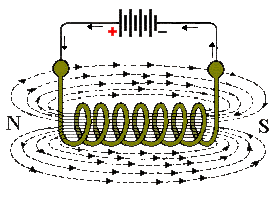|
Another day at the Tesla lab.14

Electromagnetism
Electromagnetism concerns
the science of
magnetic and electric fields. These fields are interdependent
such that a change in one field generates the other.
Specifically, a magnetic field is produced by the movement of charged
particles; the most common example being electrons moving in a wire, or
current, as can be seen in the diagram below.

Magnetic
field lines about
current loops.1
As current flows from negative
to positive through
the windings, a toroidal magnetic field is set up with a North-South
orientation. Notice the direction change in the preceding diagram
of the magnetic field above and
below the windings. The strength of the field is inversely
proportional to the distance and is usually indicated via density of
the
field lines; more lines equals a greater flux density in that region.
Similarly, a changing magnetic field gives
rise to an electric field. This concept is best illustrated via
induction. As the wires rotate through the magnetic field, and
there by cut the magnetic field lines, a current is induced in the wire
which flows in a direction perpendicular to the direction of
rotation.
Simplified
generator relies on the concept of induction.11
This concept lies behind every electric
motor, generator, and power grid in the world. The
influence of electromagnetism however is not limited to electricity;
in fact, of the four known fundamental forces in the universe it is the
most
dominant in our everyday lives. And along with gravity, literally
comprises the fabric of reality. Your
sense of touch, properties of the elements, the macro structure of
matter, friction, even light are all resultant from electromagnetic
interactions. Lets discuss the physics of the oscillating
electromagnetic wave your reading right now, which your brain is
parallel processing into my web page.
Web Project
by P. D. Wallace
University of Alaska Fairbanks
|
